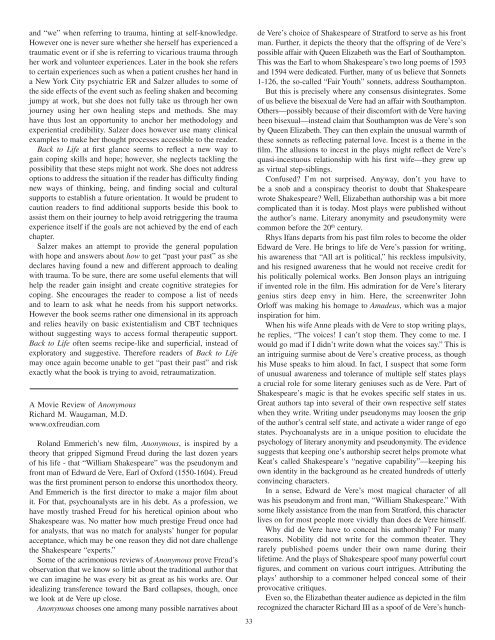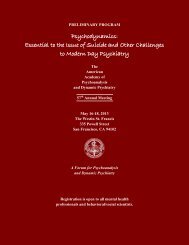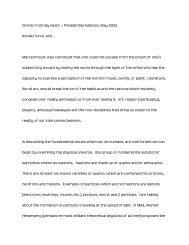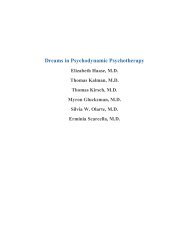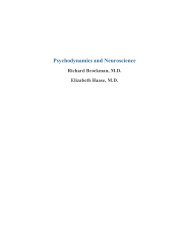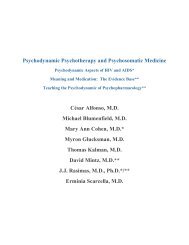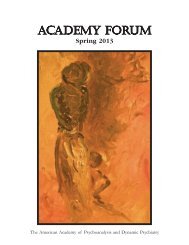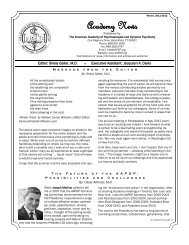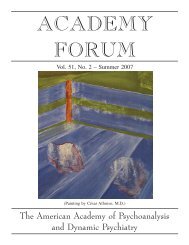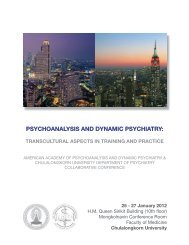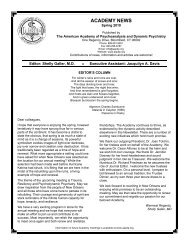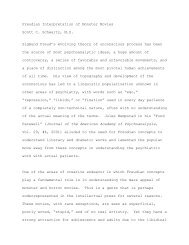ACADEMY FORUM - The American Academy of Psychoanalysis and Dynamic ...
ACADEMY FORUM - The American Academy of Psychoanalysis and Dynamic ...
ACADEMY FORUM - The American Academy of Psychoanalysis and Dynamic ...
You also want an ePaper? Increase the reach of your titles
YUMPU automatically turns print PDFs into web optimized ePapers that Google loves.
<strong>and</strong> “we” when referring to trauma, hinting at self-knowledge.<br />
However one is never sure whether she herself has experienced a<br />
traumatic event or if she is referring to vicarious trauma through<br />
her work <strong>and</strong> volunteer experiences. Later in the book she refers<br />
to certain experiences such as when a patient crushes her h<strong>and</strong> in<br />
a New York City psychiatric ER <strong>and</strong> Salzer alludes to some <strong>of</strong><br />
the side effects <strong>of</strong> the event such as feeling shaken <strong>and</strong> becoming<br />
jumpy at work, but she does not fully take us through her own<br />
journey using her own healing steps <strong>and</strong> methods. She may<br />
have thus lost an opportunity to anchor her methodology <strong>and</strong><br />
experiential credibility. Salzer does however use many clinical<br />
examples to make her thought processes accessible to the reader.<br />
Back to Life at first glance seems to reflect a new way to<br />
gain coping skills <strong>and</strong> hope; however, she neglects tackling the<br />
possibility that these steps might not work. She does not address<br />
options to address the situation if the reader has difficulty finding<br />
new ways <strong>of</strong> thinking, being, <strong>and</strong> finding social <strong>and</strong> cultural<br />
supports to establish a future orientation. It would be prudent to<br />
caution readers to find additional supports beside this book to<br />
assist them on their journey to help avoid retriggering the trauma<br />
experience itself if the goals are not achieved by the end <strong>of</strong> each<br />
chapter.<br />
Salzer makes an attempt to provide the general population<br />
with hope <strong>and</strong> answers about how to get “past your past” as she<br />
declares having found a new <strong>and</strong> different approach to dealing<br />
with trauma. To be sure, there are some useful elements that will<br />
help the reader gain insight <strong>and</strong> create cognitive strategies for<br />
coping. She encourages the reader to compose a list <strong>of</strong> needs<br />
<strong>and</strong> to learn to ask what he needs from his support networks.<br />
However the book seems rather one dimensional in its approach<br />
<strong>and</strong> relies heavily on basic existentialism <strong>and</strong> CBT techniques<br />
without suggesting ways to access formal therapeutic support.<br />
Back to Life <strong>of</strong>ten seems recipe-like <strong>and</strong> superficial, instead <strong>of</strong><br />
exploratory <strong>and</strong> suggestive. <strong>The</strong>refore readers <strong>of</strong> Back to Life<br />
may once again become unable to get “past their past” <strong>and</strong> risk<br />
exactly what the book is trying to avoid, retraumatization.<br />
A Movie Review <strong>of</strong> Anonymous<br />
Richard M. Waugaman, M.D.<br />
www.oxfreudian.com<br />
Rol<strong>and</strong> Emmerich’s new film, Anonymous, is inspired by a<br />
theory that gripped Sigmund Freud during the last dozen years<br />
<strong>of</strong> his life - that “William Shakespeare” was the pseudonym <strong>and</strong><br />
front man <strong>of</strong> Edward de Vere, Earl <strong>of</strong> Oxford (1550-1604). Freud<br />
was the first prominent person to endorse this unorthodox theory.<br />
And Emmerich is the first director to make a major film about<br />
it. For that, psychoanalysts are in his debt. As a pr<strong>of</strong>ession, we<br />
have mostly trashed Freud for his heretical opinion about who<br />
Shakespeare was. No matter how much prestige Freud once had<br />
for analysts, that was no match for analysts’ hunger for popular<br />
acceptance, which may be one reason they did not dare challenge<br />
the Shakespeare “experts.”<br />
Some <strong>of</strong> the acrimonious reviews <strong>of</strong> Anonymous prove Freud’s<br />
observation that we know so little about the traditional author that<br />
we can imagine he was every bit as great as his works are. Our<br />
idealizing transference toward the Bard collapses, though, once<br />
we look at de Vere up close.<br />
Anonymous chooses one among many possible narratives about<br />
33<br />
de Vere’s choice <strong>of</strong> Shakespeare <strong>of</strong> Stratford to serve as his front<br />
man. Further, it depicts the theory that the <strong>of</strong>fspring <strong>of</strong> de Vere’s<br />
possible affair with Queen Elizabeth was the Earl <strong>of</strong> Southampton.<br />
This was the Earl to whom Shakespeare’s two long poems <strong>of</strong> 1593<br />
<strong>and</strong> 1594 were dedicated. Further, many <strong>of</strong> us believe that Sonnets<br />
1-126, the so-called “Fair Youth” sonnets, address Southampton.<br />
But this is precisely where any consensus disintegrates. Some<br />
<strong>of</strong> us believe the bisexual de Vere had an affair with Southampton.<br />
Others—possibly because <strong>of</strong> their discomfort with de Vere having<br />
been bisexual—instead claim that Southampton was de Vere’s son<br />
by Queen Elizabeth. <strong>The</strong>y can then explain the unusual warmth <strong>of</strong><br />
these sonnets as reflecting paternal love. Incest is a theme in the<br />
film. <strong>The</strong> allusions to incest in the plays might reflect de Vere’s<br />
quasi-incestuous relationship with his first wife—they grew up<br />
as virtual step-siblings.<br />
Confused I’m not surprised. Anyway, don’t you have to<br />
be a snob <strong>and</strong> a conspiracy theorist to doubt that Shakespeare<br />
wrote Shakespeare Well, Elizabethan authorship was a bit more<br />
complicated than it is today. Most plays were published without<br />
the author’s name. Literary anonymity <strong>and</strong> pseudonymity were<br />
common before the 20 th century.<br />
Rhys Ifans departs from his past film roles to become the older<br />
Edward de Vere. He brings to life de Vere’s passion for writing,<br />
his awareness that “All art is political,” his reckless impulsivity,<br />
<strong>and</strong> his resigned awareness that he would not receive credit for<br />
his politically polemical works. Ben Jonson plays an intriguing<br />
if invented role in the film. His admiration for de Vere’s literary<br />
genius stirs deep envy in him. Here, the screenwriter John<br />
Orl<strong>of</strong>f was making his homage to Amadeus, which was a major<br />
inspiration for him.<br />
When his wife Anne pleads with de Vere to stop writing plays,<br />
he replies, “<strong>The</strong> voices! I can’t stop them. <strong>The</strong>y come to me. I<br />
would go mad if I didn’t write down what the voices say.” This is<br />
an intriguing surmise about de Vere’s creative process, as though<br />
his Muse speaks to him aloud. In fact, I suspect that some form<br />
<strong>of</strong> unusual awareness <strong>and</strong> tolerance <strong>of</strong> multiple self states plays<br />
a crucial role for some literary geniuses such as de Vere. Part <strong>of</strong><br />
Shakespeare’s magic is that he evokes specific self states in us.<br />
Great authors tap into several <strong>of</strong> their own respective self states<br />
when they write. Writing under pseudonyms may loosen the grip<br />
<strong>of</strong> the author’s central self state, <strong>and</strong> activate a wider range <strong>of</strong> ego<br />
states. Psychoanalysts are in a unique position to elucidate the<br />
psychology <strong>of</strong> literary anonymity <strong>and</strong> pseudonymity. <strong>The</strong> evidence<br />
suggests that keeping one’s authorship secret helps promote what<br />
Keat’s called Shakespeare’s “negative capability”—keeping his<br />
own identity in the background as he created hundreds <strong>of</strong> utterly<br />
convincing characters.<br />
In a sense, Edward de Vere’s most magical character <strong>of</strong> all<br />
was his pseudonym <strong>and</strong> front man, “William Shakespeare.” With<br />
some likely assistance from the man from Stratford, this character<br />
lives on for most people more vividly than does de Vere himself.<br />
Why did de Vere have to conceal his authorship For many<br />
reasons. Nobility did not write for the common theater. <strong>The</strong>y<br />
rarely published poems under their own name during their<br />
lifetime. And the plays <strong>of</strong> Shakespeare spo<strong>of</strong> many powerful court<br />
figures, <strong>and</strong> comment on various court intrigues. Attributing the<br />
plays’ authorship to a commoner helped conceal some <strong>of</strong> their<br />
provocative critiques.<br />
Even so, the Elizabethan theater audience as depicted in the film<br />
recognized the character Richard III as a spo<strong>of</strong> <strong>of</strong> de Vere’s hunch-


